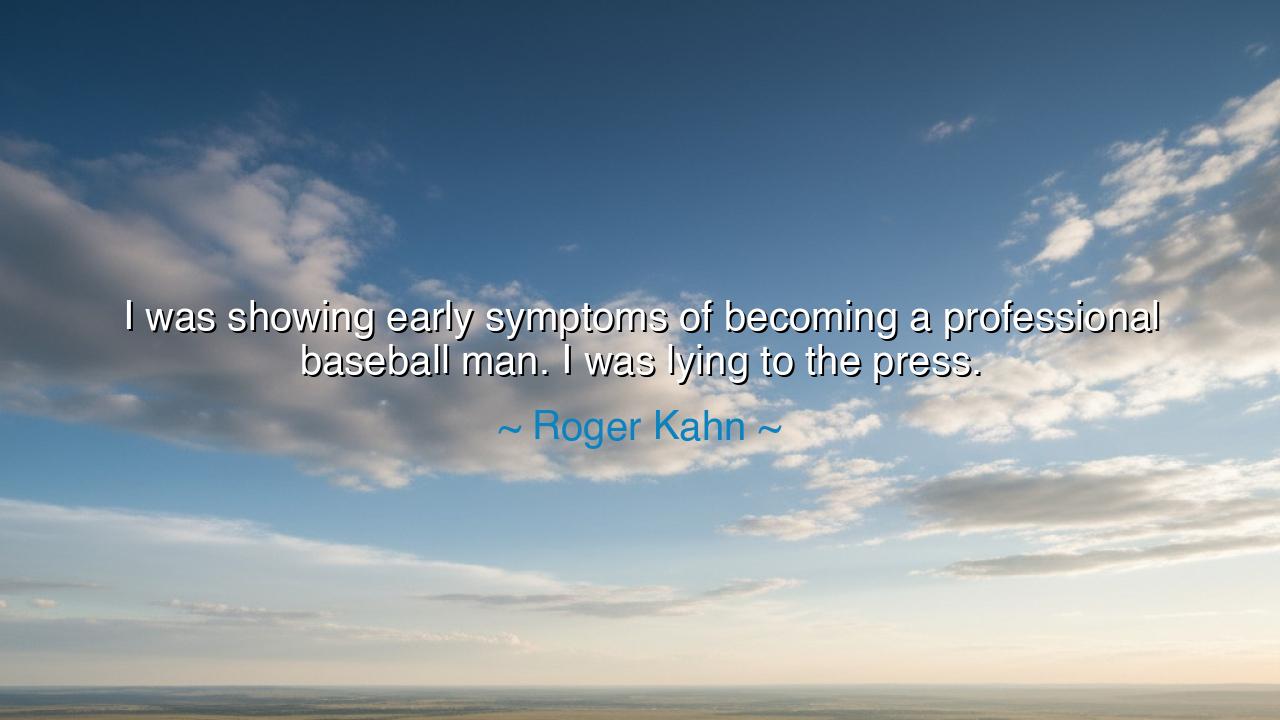
I was showing early symptoms of becoming a professional baseball
I was showing early symptoms of becoming a professional baseball man. I was lying to the press.






Hearken, O seekers of reflection and insight, and attend the words of Roger Kahn, who spoke with wry humor and quiet self-awareness: “I was showing early symptoms of becoming a professional baseball man. I was lying to the press.” In these words lies a meditation on the transformation of character under the weight of ambition, the subtle seductions of fame, and the tensions between authenticity and performance that accompany entrance into the public eye.
The origin of this insight rests in Kahn’s life as a writer and chronicler of baseball, observing both the heroes of the diamond and the culture that surrounded them. To become a professional baseball man, Kahn recognized, was not merely to master skill on the field, but to adapt to the theater of attention, the expectations of reporters, and the narrative that shaped public perception. In his admission, we perceive a timeless tension: the human desire to project competence and composure, sometimes at the expense of complete honesty.
Consider the story of Babe Ruth, whose exploits on the field were matched by careful cultivation of persona off it. Ruth, like many athletes, understood that the press and public demanded stories of triumph, bravado, and invincibility, sometimes requiring embellishment or omission. Kahn’s observation reflects this duality: mastery of sport entails mastery not only of skill, but of narrative and perception, revealing that the professional life of an athlete—or chronicler—is entwined with both reality and artifice.
The ancients understood this principle in their own spheres. In the courts of kings and the arenas of philosophers, individuals presented themselves in carefully crafted ways, sometimes exaggerating virtue, courage, or wisdom to achieve influence or maintain reputation. Cicero, for instance, in crafting speeches for the Senate, navigated both truth and persuasion, aware that public perception shapes opportunity. Kahn’s admission is a modern echo of this enduring reality: the professional world often demands performance beyond mere technical skill.
Yet there is wisdom in Kahn’s candidness. By acknowledging his early lies, he illuminates the subtle ways in which ambition can tempt compromise, and the importance of reflection and self-awareness. The lesson is not condemnation, but understanding: to navigate professional life—whether in sport, art, or governance—requires awareness of how image, narrative, and reality intersect, and how integrity must be consciously preserved amid external pressures.
From this reflection, a lesson emerges: aspire to mastery in both skill and character. Recognize that professional life, especially when under public scrutiny, challenges honesty and authenticity. The capacity to reflect on one’s actions, admit missteps, and strive toward alignment between appearance and truth is as crucial as the technical excellence that initially opens the door to success.
Practical action flows naturally: cultivate self-awareness, practice honesty in communication, and maintain integrity even as ambition drives you toward recognition. Learn from experience, observe the behaviors of mentors and role models, and navigate the intersection of skill and perception with discernment and care. By doing so, one preserves both reputation and conscience, ensuring that professional achievement does not come at the cost of character.
Thus, let the words of Roger Kahn endure: to enter the world of professional sport, or any realm of public pursuit, is to confront the dual challenge of performance and perception. Admit the temptation to embellish, reflect upon it, and commit to integrity. In doing so, one masters not only the craft but also the soul, ensuring that triumph in skill is matched by honor in character.






AAdministratorAdministrator
Welcome, honored guests. Please leave a comment, we will respond soon